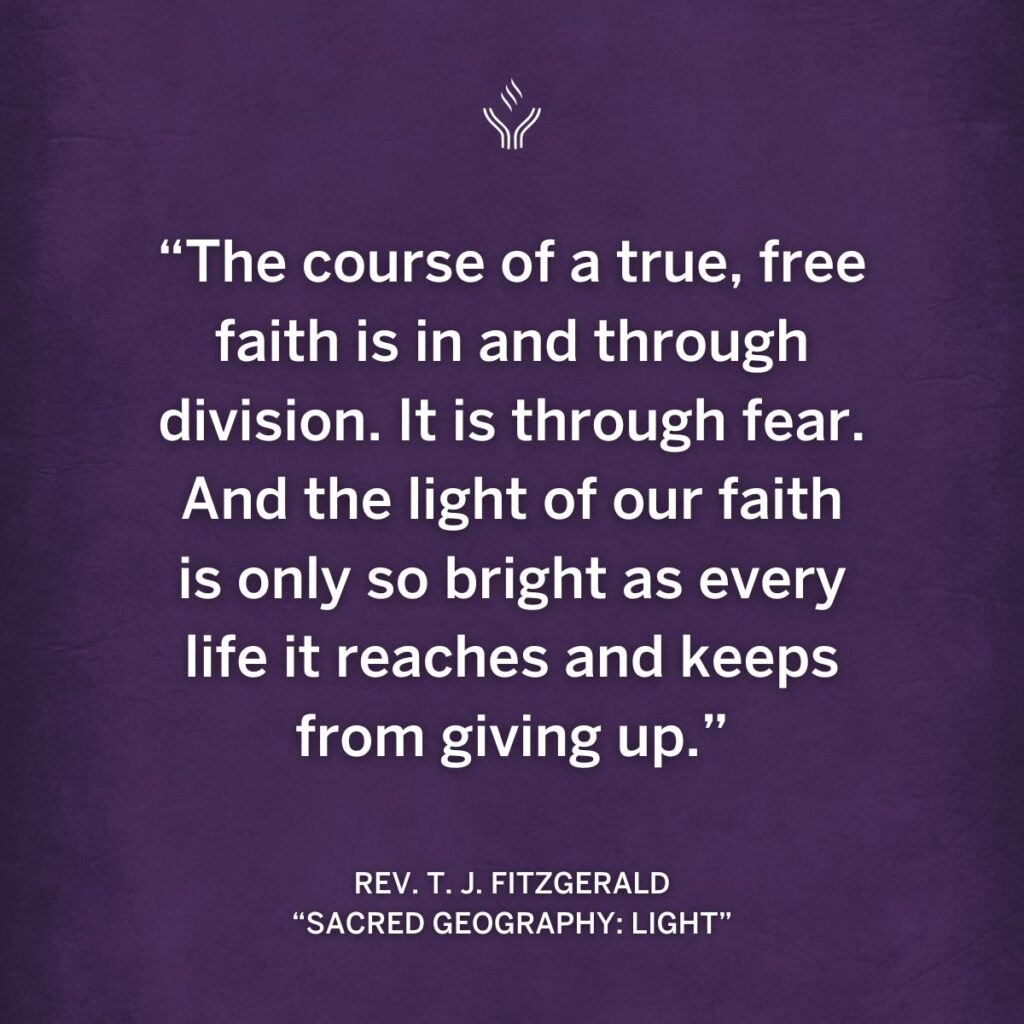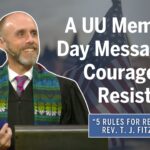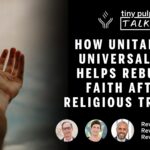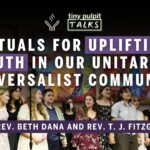Sacred Geography: Light | Rev. T. J. FitzGerald | 03.17.24

The ways to freedom are lit in many ways. Together we look for our guiding lights to light the way on our journey. This sermon is part of our Sacred Geography sermon series, where we are locating sacred touchpoints in our inner world and the world around us.

So how many people here have heard of a company going public? All right, keep your hands up. I’m just taking notes for the revolution when it starts. No, no, we’re going to need all you capitalists too, trust me. A company going public means the companies shared, held by a group privately, are taken by some bankers and lawyers and some other people, and converted into kinds of shares, and then offered to the public. Then that company goes from private ownership to ownership by some in the public. And this is called an initial public offering or an IPO. Getting one off the ground successfully takes a ton of work. Bankers, accountants, lawyers, executives, shareholders, all come together and work and work and work in solidarity. For what?
Profit, that’s right. You could say money, but the answer is profit. Initial public offerings are one way to maximize profit. And profit is the guiding light of the United States economy and much of the international economic enterprise. The faithful, expert hours of work and diligence of people across professions and across the world, spent to convert a company from a private enterprise to one that is worthy of public trust. And can, therefore, realize its tremendous potential of profit, should be perfect. Everyone works in lockstep, striving for this perfection. It is one of the most powerful experiences of solidarity alive in the world today. And why? Because it is worth it, yeah, to everyone involved.
We are keeping it simple today in the sermon, friends. No surprises. Solidarity is worth it to everyone involved. But solidarity does not come easy. And in the case of IPOs, it doesn’t come cheap.
Inequity and solidarity
About a week and a half ago, Daniel, Beth, and I were at a meeting of faith leaders and organizers. The Crow lecturer, Jeff Sharlet, presented a bit to the group before coming to speak to us. And there was a time for dialogue afterwards.
I heard a lot of good things in that meeting, but the hardest thing to hear might have been from Sharon Middlebrooks, the president of the NAACP in the Dallas area. She said how nice it was to hear us talking about matters of race and racism. But she travels anywhere she’s invited to engage people about equity and race. And she goes, she shows up, she listens, and engages. And then she sees what happens in the world, in this state, and in Dallas, and how inequitable it is. And the only logical conclusion she can reach is that, at some point, someone is talking in a good game in one of the many rooms where she travels. But when it comes down to it, when the decision to act for equity is made, or a chance arrives to repair historical inequity, when that chance comes, someone she’s sat in a room with, who talked that good game, who is now in a different room, talking to different people, doesn’t act. Doesn’t take the chance to live up to what they said they’d do when they were in that room with her. They didn’t take the chance.
Why? They didn’t think it was worth it. They didn’t see the value. They didn’t see what they had to gain in that moment. Maybe they didn’t fear enough what they might lose. No matter what it was, there was no solidarity. When what there is to gain is not totally clear, solidarity doesn’t come easy. Solidarity, actually, rarely comes at all. Because it’s hard to work together in concerted action to achieve a common goal when people are not taking the action that they say they’re going to take.
Solidarity in action
So how does solidarity actually work? One of our readings today is from Ralph Ellison’s “Invisible Man.” It took seven years for Ellison to write this book. He started it while staying on a friend’s farm, and then worked on it while serving on ships all around, as he worked as a Merchant Marine. After its debut in 1952, it won the National Book Award for Fiction in 1953. Some of the reviews are pretty racist, I got to say. But most were as glowing a review for a book as you will ever see. It also has the distinction from the American Library Association, this will not surprise you, I bet, of being among the most banned and challenged classic books of all time.
In the reading, Ellison’s anonymous narrator says, “Without the possibility of action, all knowledge comes to one labeled ‘file and forget’. And I can neither file nor forget.” He’s saying, “What’s the use of knowledge if you don’t act on it?” And he is not going to file and forget the knowledge anymore. And the narrator goes on to say that telling his story, writing it down for the reader, taking that action, at least, lifts him up again from that file and forget pile.
Remembering Tyler Clementi
Now, I’ve seen some piles of files in my day, friends. Oh, I remember all the files, all the piles and piles of files on my desk in my office, where in another life, far removed from here, I practiced law, high overlooking Park Avenue. My office was in that building at the end of Park Avenue that you all have probably seen in the movies, with the copper top, the two tunnels going through it. One generation calls it the Helmsley Building, a more venerated generation, the New York Railroad Building, today’s generation, 230 Park. It looks like a lighthouse, actually. Right there, at the end of that great and famous thoroughfare, lit up every night, just beckoning people south of Midtown, “Come, it’s fine over here.” I labored there sometimes all hours of the night, keeping the fire of profit lit and burning bright, shoveling the coal. No file too big to tackle, no file too small to forget, especially, especially on the run-up to an IPO.
I told you no surprises in this sermon. I was in the flow once. I was answering all the emails, scouring every file, not leaving a thing out of my due diligence reports, so that IPO would be just perfect. That public offering would be the most profitable and would yield the greatest effect for the client, not to mention the eventual investors. Then out of the corner of my eye, I saw someone move in to my doorframe. My colleague was there, hovering a little, peeking in, which wasn’t like her. The same place she’d usually stand to give me assignments or to talk things over. And I also knew she was supposed to be hard at work on the same public offering here. But instead of directions, instead of questions, she was crying. And she asked me, “Have you seen?”
And, today, I tell you a piece of the story that I don’t tell often, and I’m not proud of telling. The truth is that about an hour before she came to my office in tears, I saw a news report, an alert pop up on my computer. I read it and I went back to work. The report said that 18-year-old Tyler Clementi had jumped from a bridge to his death, after his college roommate had secretly filmed him kissing another boy and then shared it electronically with others. Had I seen it? Yes. But there was so much to do. I’d seen stories like that before. I’d considered doing something like that when I was Tyler’s age myself, if I’m being honest. Without the possibility of action, all knowledge comes to one labeled ‘file and forget’.
What could I do? What could I do, but just file it away? What could I do 24 floors above when Tyler Clementi had been taken so low? I could tell you myself, but the banned words of a visionary say it better. “Too much of your life will be lost. It’s meaning lost, unless you approach it as much through love as through hate.” So I approach through division, so I denounce and I defend and I hate and I love. I could not be there for Tyler, that sweet, young man. And I hate that. I hate that still. I want to be clear. I don’t hate myself. I don’t hate my employer. I don’t even hate the $4 billion of wealth I played a teeny, tiny role in creating for my client with that offering in an instant.
What I do hate, and I know that’s a hard word, it’s not mine, it’s also Ellison’s, what I do hate is that a blessed child of this world felt themselves unworthy to be in it because of who they are and whom they choose to kiss. And I hate that every time I hear it, I hate the fear he must have felt. And I knew before ever reading Ellison’s words that something had to change in my life. I knew that I could no longer file and forget from that moment. I wanted to be part of a project, of a structure, of a faith that spoke, that practiced, and that tried to put as much love in this world as there is hate in it. And I knew I needed to work harder, more effectively, and with more passion than I had ever practiced the law. No more filing and forgetting, no more looking away. Hate on a side, love on a side, or maybe just mixed up together. Ellison says we approach through, through division, not stopping, not past, not over or around, but through.
I think of Tyler Clementi and so many like him. And not just young, gay men, but all the people in the world, all the people in our city, all the people right here. You watching, you online, anyone within the sound of our voice. And I could say, I could say, “I wonder what messages told them they were alone?” I could say, “I wonder what public offerings of support there were or weren’t?” I could say, “I wonder if he could trust those around him, when the world turned hostile, to do what they said they would do when the time comes?” I could say all this because I still wonder today myself.
There are times, just in a diner or walking down the street, when I’m walking with a friend. And I get excited about something, maybe a little too close, while getting a little too gay. And I see them look around, nervous, anxious a little. And I don’t know what’s really crossing their mind because I’m afraid to ask. Maybe they fear for my safety in a hostile place. Maybe they’re wondering if I’m about to attract aggression. Maybe they’re worried that a potential date or mate of theirs might think they’re gay too and get chased off. Or maybe I’m just being annoying, which diners aren’t always places to sing Sondheim, I get it, kind of, I kind of get it. (singing)
But every time it happens, every time I realize I’m afraid to ask what my own friend is thinking, I feel a tiny, little bit, I think, of what Tyler, and so many others, have felt and maybe feel now today. The light inside me dims and I hate that fear. I hate it. Maybe I should ask, “Will you have my back? Will you risk something to be sure that will never happen to me? Will you do it in public? And if not for me, then who? If not now, when? How much more will you have to love someone to act in solidarity? How close must the risk be to you and to your security to act in solidarity?” These are the questions solidarity is asking, but they are the questions asked of those not in complete solidarity. Because if you’re in solidarity, no one’s going to ask.
A true faith lights the way
But, T.J., do you expect me to be in solidarity with everyone? Well, I’m glad you asked. How valuable do you think solidarity is? Can you put a number on it? That company’s IPO was $4 billion. A little over a decade later, the same company is worth $13 billion. And I tell you true, a church that has the backs of all its members in this world we are living in now, and in the world that I think is coming, is worth multitudes more than that, even accounting for inflation. At least that’s what it’s worth to me.
In Invisible Man, the anonymous narrator speaks to us from underground, in a space lit by more than 1,000 electric lights. The narrator says, “And I love light. Perhaps, you’ll think it’s strange that an invisible man should need light, desire, light, love, light. But maybe it is exactly because I am invisible. Light confirms my reality, gives birth to my form.” He says, “The truth is the light. The light is the truth.”
I don’t think it was mistake that Ellison, a professional sailor, wrote those words. He knew the power of a beacon on a craggy shore that lit the way for ages and ages of sailors before him, through the coursing fear of the unseen, unknowable, fearsome tides. A true and honest faith is only as true and honest as the faithful in it. And to be together, to trust and act, the truth we tell about the fears we have, and what we need to survive these times, will light the way. We have some rough waters ahead of us, friends. A faith that speaks the truth about what it sees is a light in a growing national and international storm that glows and reaches from the far shore that holds the churning tides of love and hate. The course of faith, of a free faith, of a true faith, is in and through the division. It is through the fear. And the light of our faith is only so bright as every life it reaches and guides through these waters, and keeps from giving up, or keeps from falling in.
May we labor together in solidarity to meet this public charge, to pray this public prayer, and to make this public offering, in this place, with this faith, and with the incalculable, inherent worth of each one of us, of all of us, now and forever more, and may it ever be so. And it helps me in hard times, when I’m afraid, and when I wonder if I am up for all that this faith asks of me, to remember that Clementi in Latin means merciful. Thank you all for my life today. And amen.







